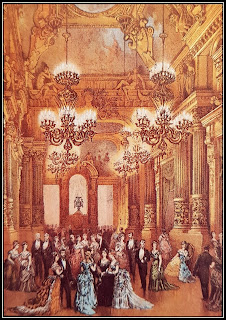Georges Bizet was born on October 25, 1838, in a simple family home, in the Parisian apartment of Montmart. Aimée, his mother, an amateur pianist, recognized early his musical talent in her only son and taught him notes and alphabets when he was four years old. Adolphe, his father, a tour maker who became a singing teacher, also encouraged Georges and gave him the little musical knowledge he possessed.
The enthusiasm for Georges' music education had its price. His growing love of literature was suppressed by his mother, who hid his books so Georges to concentrate on music. However, his parents' monomania was rewarded when Georges won a place at the Paris Conservatory on October 9, 1848, just before his tenth birthday.
In a few months he began to prize his wonderful playing on the piano and eminent musicians were eager to teach him. The Conservatoire's retired music teacher remained at the Conservatory for his sake, while the brilliant French opera composer Charles Gounod immediately liked the boy. Bizet had an amazing memory and could assimilate and reproduce everything he was taught.
 |
| The noisy streets of Montmartre was a familiar sight for the young Bizet, who grew up in this artistic district Paris. |
Bizet had found his way. The first taste of success came with the Grand Prize of Rome, which he shared with another composer in 1857. His immediate future was written in gold letters. That winter he traveled to Rome. Arriving there in January 1858, the intelligent 19-year-old was given the vertigo of social life.
He was immensely loved. Although he lacked classic beauty - he had a pink, childlike colour, blond hair and thick glasses - his sense of humour (he once appeared at a dance dressed as a baby) made him lovable to anyone he met. Meanwhile, his playing on the piano impressed the great composers of the time, including Franz List.
Doubts
It was in Rome that he began to doubt his abilities. Inexplicably, he sent a comic opera to a sacred music competition - which he certainly lost. He saw the event as an affront to his intelligence. Then came the misfortune: in 1859 while on vacation, he contracted tonsillitis (a chronic inflammation in the larynx) while treating a sick friend.
This condition made him sick later in life and eventually accelerated his death. Bizet returned to Paris to cement his reputation as a composer. The next year his mother died, at the age of 45, and that crushed him. Bizet relied highly on her opinion of his compositions, and her death severely shaken his self-confidence.
Rome's prize money ran out in 1862, and Bizet was forced to undertake some noble work at a music publisher. He often worked 16 hours a day to be consistent with their editorial schedules. He therefore had little time left for his own compositions and what he did not meet his demanding criterion.
Over the next six years, everything he started composing, soon abandoning it and destroying it. However, some works were salvaged. His opera, Les Pecheurs de Perles (The Pearl Fishers), had some success, but the reviews were unfavorable. Only the play La Jolie Fille de Perth (The Fair Maid of Perth), first presented in 1866, was liked by both listeners and critics.
The need for more money prompted Bizet to participate in music competitions - but he never won. Frustrated he began to believe that there was some conspiracy against his work. He wrote to his publisher in 1866: "More and more denial and frustration surrounds me and I don't understand why."
A relationship full of passion
Bizet was tormented by his illness. His heart was weak, he was prone to rheumatism attacks that paralyzed him, and hard work made his condition worse. His only joy was the summer residence he inherited from his father in 1863 in a holiday suburb of Paris.
The 25-year-old Bizet began a fiery relationship with one of his neighbors, the Countess de Moreton de Sabriyan. A former prostitute and circus artist, he is said to have been the role model for the main character of his opera, Carmen.
In 1867 Bizet fell in love with Geneviève Halévy, the 18-year-old daughter of his former teacher. His self-confidence suffered another blow when her family broke off their engagement a few weeks after Bizet's marriage proposal. The marriage finally took place two years later, on June 3, 1869. On their return to Paris, Bizet toiled by producing one opera after another, and they all found the same lukewarm criticism. Some never made it to the scene. His hopes for the success of Don Rodrigue were lost when the theatre where it was to be performed burned down in October 1873.
 |
| A portrait of Geneviève Halévy. Despite the serious objections of her family, the couple married in 1869. |
In the meantime, he had started Carmen, who it was about to become his best-known work. The destruction of the theatre and other production problems delayed the first presentation until March 3, 1875. Once again the realism of his work found unprepared listeners and critics, who hostilely confronted his masterpiece.
Nervous breakdown
Happiness lasted a while. In July 1870, France was at war with Prussia. Unlike other composers who left Paris, Bizet remained and even joined the militia. During the fierce winter siege that followed, Bizet and Geneviève came to feed on mice. A trip to Bordeaux the following summer failed to calm Geneviève who suffered a nervous breakdown.
At that time Bizet had been bent by a crisis of acute tonsillitis, from which he could not be relieved. In May he left the city for the healthier atmosphere of the suburbs, but to no avail. A bath in the River Shen caused him a severe rheumatic crisis, which led to two heart attacks. Bizet died on his sixth wedding anniversary on June 3, 1875.


Comments
Post a Comment